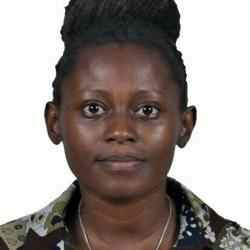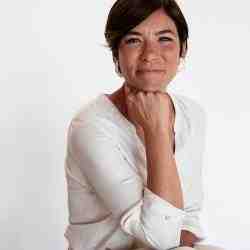Introdução
Anna protects Philippine coastal marine resources through a unique arrangement of conservation approaches that flow and feed into each other as it reinforces the core objective of empowering young scientists, activists, and leaders as changemakers for the environment.
A nova ideia
Anna is enabling individuals and institutions to gain a fundamental understanding and appreciation of the oceans and ultimately the tools to translate it into meaningful impact. In the Philippines, environmental research campaigns often seem intimidating or irrelevant to the daily realities of people who do not come from a scientific background. Through Save Philippine Seas (SPS), Anna focuses on making conservation inviting, exciting, and impactful by engaging youth, businesses, and governments to collaborate on initiatives—whether it’s shifting policies, starting up marine health innovations, establishing model marine protected areas, or witty information campaigns that are relevant and easy to understand.
A strong current driving Anna’s work forward is her radical belief in the power of young changemakers. Anna has set up SPS as an action-oriented movement, establishing multiple programs that empower everyone to be environmental changemakers – combining research, resource mobilization, citizen science, online and educational campaigns and policy work.
She identifies shark conservation, waste management and circularity, and environmental education as the three levers to facilitate a sea change moment in marine conversation and effectively transform Filipino citizens and institutions into who she has coined seatizens —people who are reconnected to the bodies of water that surrounds them and collectively desire and act to preserve its biodiversity. In all three key areas, Anna is already organizing and empowering young changemakers, putting pressure on government and policymakers, and influencing a shift in business practices through innovation challenges. For shark conservation, Anna has established the first marine sanctuary protecting thresher sharks – a keystone species essential for coral reef health and other smaller species that depend on seagrass and reef ecosystems – that is becoming a model in its other marine protected areas in the Philippines and Alor Isla, Indonesia. In waste management and circularity, Anna has influenced business shifts in values-aligned multinationals to create a clear roadmap to moving away from plastics such as her Reimagine Recycling initiative with Coca-Cola Foundation and a policy proposal that will be picked up in the Philippine Congress in 2022 which she co-led with the Food and Drug Administration to legalize cosmetic and personal care refills. Finally, Anna’s biggest and most exciting impact is her role in mainstreaming environmental education through her Environmental Education Kits and modules being adopted by the Philippines’ Department of Education to be scaled nationwide.
O problema
The Philippines is the largest archipelago in the world that is surrounded completely by oceans. It is considered as the center of the Coral Triangle, the world’s most marine biodiverse region, with Philippine waters hosting 16,800 square kilometers of coral reef. The seas are vital to the country’s economy, tourism, food supply, and security. About 70% of Philippine municipalities are located along the coast. Currently, the Philippines has lost more than half of its coastal natural habitats and sits at the top of global conservation priorities. A nationwide assessment of Philippine coral reefs revealed that none of the sites surveyed had reefs in excellent condition based on live coral cover, and more than 90% of the same sites were classified under the poor and fair categories. While many factors contribute to marine degradation, plastic pollution, poor biodiversity conservation, and widespread apathy or ignorance regarding ocean health due to the lack of access to proper education and empowerment for citizens are among its deeply rooted causes.
In terms of plastics, the World Bank reported that the Philippines recycled about 28% of the key plastic resins in 2019 and 78% of the material value of plastics is lost to the Philippine economy each year. A report by GAIA and the Mother Earth Foundation estimates that Filipinos collectively use 164 million sachets and 57 million plastic sando (a single-use plastic with handles) bags daily. The same report also estimates that 16.5 billion plastic labo (a single use plastic without handles) bags are used annually.
With sharks, a 2021 assessment reports that the shark population has declined by 71% since the 1970s. According to the International Union for Conservation of Nature’s (IUCN) assessment in 2021, approximately one-third (32.6%) of shark species are threatened with extinction, a jump from the 2014 assessment of one-quarter (24%) (Dulvy et al., 2021). Out of the 200+ species of sharks in the Philippines, only 25 species are afforded national protection. Sharks are also keystone species in the sense that monitoring sharks, who are at the top of the food chain, indicates the marine health of those lower into the food chain – from small fishes, corals, and other sea life.
However, conservation is not just about saving species, but is dependent on challenging cultures and entire systems of belief. Though the Philippines has passed a number of historic environmental laws, its marine habitats remain ravaged by everyday human activities. The condition of the Philippines’ marine environment is a result of an underlying issue ignored by more traditional environmental organizations – the majority of the population have been disconnected and desensitized to the state of archipelago’s marine environment and how its destruction, and potential renewal, directly affects their own communities, livelihood, and health. Citizens and coastal communities are not moved to act because the ocean is something a majority have been disconnected from. Coastal communities who engage in illegal fishing, for example, are not aware of alternative approaches like sustainable fishing and the long-term harm their extractive methods are creating. Plastic dumped in oceans by communities are due to lack of better waste management frameworks and an “out of sight, out of mind” mindset. Filipino youth who do want to do something, are often discouraged by a hierarchal culture wherein they are taught to bide their time, not to challenge elders or traditions, and focus only on their studies.
A estratégia
No matter how hard-hitting an environmental campaign is, if people see it as something they cannot understand or relate to, then they simply will not care enough to act. Anna concluded that to make real progress in saving our seas, the focus needed to be on empowering local citizens, especially youth, to get invested in protecting the marine ecosystems within their own communities.
Anna’s fundamental purpose is to make environmental conservation a part of the Filipino lifestyle and everyday discussion. Other conservation groups, such as Greenpeace, partner with Save Philippine Seas to publish their findings in a way that would be appealing and relatable to Filipinos. SPS campaigns use a lot of puns and play with popular icons or trends that are familiar to pop culture and integrate a conservation message along the way, like using well-known Filipino phrases to personify recyclable items and marine species. Because of this, SPS has acquired an active online following, creating a much bigger capacity for collective awareness.
SPS focuses on three key themes: waste management and circular economy, shark conservation, and environmental education and conservation leadership.
Waste Management and Circular Economy
Recognizing the Philippine waste management crisis, Anna and SPS are working on policy advocacy campaigns and capacity-building programs for waste management and circular economy. In 2018, Anna co-led a policy proposal addressed to the Food and Drug Administration to make refilling of cosmetics and personal care products legal in the Philippines. The proposal was brought to the regional Southeast Asia meeting in 2018 and 2019 but was shelved in 2020 and 2021 due to concerns over hygiene during the COVID-19 pandemic. SPS is committed to pick up the proposal in 2022. In early 2021, Anna led the SPS team to conduct the Circularity Assessment Protocol in three cities in Metro Manila in partnership with the University of Georgia. This research project collected data on waste management and circularity to aid legislation.
Beginning in 2021, SPS has been working with UN Habitat and the Institute for Global Environment Strategies (IGES) to facilitate workshops with the private sector on a circular economy for plastics; produce learning materials on marine litter for facilitators; and develop policy papers on extended producer responsibility, community-led behavior change, and waste management infrastructure. SPS also now works with multinational companies with clear and sincere sustainability goals, such as Coca-Cola Philippines, Mondelez Philippines, and CEMEX Philippines. SPS’s program with Coca-Cola Philippines called Reimagine Recycling is about to begin its fourth year with the goal of supporting emerging initiatives to help meet Coca-Cola’s collection and recycling targets.
Shark Conservation
In 2012, Save Philippine Seas launched the Shark Shelter Project – a multi-stakeholder, community-based initiative on the island of Malapascua. Realizing how much of the island’s economic continuity depended on shark tourism, Anna wanted to create an inclusive and holistic conservation plan that focused on the community members, as much as the sharks. SPS’ takes on a “full value chain approach” – starting from education and awareness, livelihood practice, resource mobilization, and policy work. The Shark Shelter Project empowers the citizens of Malapascua to collectively become invested in protecting the marine life surrounding their own island.
By 2014, local sea wardens that SPS had trained (“Bantay Dagat Program”) were conducting their own information campaigns about coral protection, teachers had integrated waste management practices in the curriculum, and dive guides formulated their own code of conduct to self-police practices. In 2017, SPS sought out to develop a management plan; pilot community-based, participatory interventions in surrounding sites; and expand their Bantay Dagat (Sea Warden) education program to include teaching fisherfolk about sustainable alternative livelihoods. From 2017-2019, SPS accomplished these goals, which led to the ordinance establishing a Marine Protected Area (MPA) network in early 2021. In 2020, Anna and her long-time local collaborator worked on installing mooring buoys in four marine protected areas (MPAs) in Daanbantayan’s municipal waters, which provided temporary source of income for dive guides and boat crew who lost their jobs during the lockdowns from the Coronavirus-19 (COVID-19) pandemic.
Anna would serve as the lead campaigner to draft a comprehensive shark conservation bill by 2020. In 2016, 2017, and 2019, Anna was a technical adviser to the Philippine government for the Convention on Migratory Species (CMS) and Convention on International Trade in Endangered Species of Wild Flora and Fauna (CITES), where she co-led the development of position papers and campaign strategies for the Philippine government to advocate for shark and ray protection in the international forums. The outcome of the 2019 CITES meeting meant an additional four shark and ray species were afforded national protection.
From 2017-2019, Anna and her colleagues traveled around coastal areas in the Philippines to consult fisherfolk, shark fishers, enforcers, and government officials with the goal to develop an enforceable, socially just, and science-based national policy for sharks. The bill was filled in the Senate and House of Representatives in 2018 and again in 2019. In 2020, the protection of sharks was integrated in the proposed amendment of the Wildlife Act of the Philippines. Since the national elections took place in 2022 before the bills were passed, Anna and her team are focusing on collecting data to strengthen the national policy before it is refiled in the next Congress and developing a national and international campaign strategy for sharks and rays for the upcoming CITES meeting in November 2022.
Environmental Education and Conservation Leadership
Save Philippine Seas’ youth program, the Sea and Earth Advocates Camp, is the first environmental education leadership program of its kind in the Philippines. In line with the focus on making conservation approachable, youth participants are essentially taught how to break down an environmental problem and tap their individual potential to develop solutions. Participants are taught to map out complex issues, identify points of impact, and implement projects using transferable skills. At the end of the experience, selected participants can receive funding and mentorship to continue their community-based projects.
When Anna established the program in 2014, they had less than 200 applicants. By 2018, they had over 2,000 applications. SEA Camp alumni have gone on to establish their own initiatives and social enterprises. In 2015, the results of the pre-, post-, and delayed post-tests yielded a statistically significant increase in knowledge, attitudes, entrepreneurial orientation, and environmental behavior of the participants. At least 20% of alumni have received grants from other funding sources to implement and sustain their own environmental projects. After eight local camps held in the Philippines, Save Philippine Seas hosted its first regional SEA Camp in 2017, bringing in participants from all 10 Southeast Asian countries. The second one was in 2018, and the last in-person SEA Camp took place in 2019.
Many of the alumni, some of whom had never imagined themselves pursuing environmental initiatives, are now founders of environmental social enterprises, or actively leading future SEA Camps, socio-civic initiatives, and marine conservation-related projects. Anna replicated the SEA Camp model to succeeding programs of SPS: the 2019 and 2021 Haquathon, a hackathon that seeks to support technology-based solutions in the Philippines and Southeast Asia; and the Young Southeast Asian Leaders Initiative (YSEALI) Marine Accelerator Program, which aims to build the capacity of emerging leaders in Southeast Asia and support their initiatives with small grants (up to $4,500).
In early 2017, Save Philippine Seas began working with the Ocean-Action Resource Center (ORC) to strengthen conservation education (CE) in the Philippines. A main aspect of the collaboration is to create Conservation Education Toolboxes (CET) that are developed for use and replication by education partners in their respective areas. The toolboxes contain comprehensive conservation education materials and tools for impact evaluation. In 2020, SPS was poised to adopt a coastal community in Batangas to strengthen the school’s environmental education program. Due to the pandemic, SPS pivoted to develop Earthducation Kits, an evolution of the CET. SPS partnered with the Department of Education and the skincare brand Kiehl’s to pilot 50 Earthducation Kits for distribution in 2021. The monitoring and evaluation activities in early 2022 indicated the potential to grow these kits and expand their scope.
In 2020-2021, SPS adapted their environmental education and conservation leadership programs to virtual platforms. They secured a partnership with the Department of Education-Disaster Risk Reduction Management Services and UNICEF to develop a climate education and action program for adolescents called Change the Current. Building on its success, SPS is about to start working on a similar program for teachers, which will be rolled out from 2022-2023 with the intent to train-the-trainers. Change the Current 2.0 also includes developing an online repository of climate education materials appropriate for the local context.
A pessoa
From a young age, Anna fell in love with the ocean. Her father is an environmental lawyer who instilled in her the responsibility of protecting the Philippines’ natural wonders. However, Anna did not see environmental conservation as a career growing up because she was devoted to the performing and literary arts. She performed professionally from the age of 12, singing in corporate shows, acting in musicals, and emceeing events, until she graduated from college in 2011 with a degree in BA English Studies. As a professional at a young age, she was also hired to teach musical theater to both kids and adults where she learned how to tweak her teaching approaches to optimize learning.
Her father also showed her the joys of pursuing one’s passions over society’s conventions. In 2008, while on summer break from college at University of the Philippines, Anna helped her father organize an event called the Global Legal Action of Climate Change. It was then that she was able to realize the true potential of individual and collective action. Anna learned that one can make an impact, no matter how small the initiative is in relation to the issue.
When Anna returned to school, she co-founded an organization called Isko Cleans UP – a waste management initiative that held monthly recyclables fairs and workshops throughout the campus. Because of this initiative, the University of Philippines-Diliman effectively banned the use of styrofoam on campus and institutionalized the recyclables fair after it was adopted by a student organization and the student council. Upon realizing that so many of the available school literature on climate change is anchored on the West, Anna and her co-founder wrote a textbook entitled “An Introduction to Climate Change for Filipino Youth” to make the topic relatable to their fellow classmates.
A few months prior to graduation, Anna was able to join the Philippine delegation to the UN Climate Change Conference in Mexico, where she had her first experience of multilateral negotiations.
In 2011, Anna learned about a large-scale illegal wildlife trade issue. Deeply disturbed by it, she began writing to peers, local leaders, and even strangers – eventually starting an online campaign that grew into Save Philippine Seas (SPS) today. Anna immediately became the face of this issue, representing SPS in Senate hearings and the media. By 2012 Anna had become the youngest winner of the Future for Nature Award. Through this program, she was able to create the Shark Shelter Project in Cebu and establish SPS as a thriving organization.



